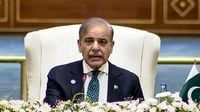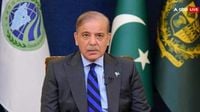In a dramatic turn of events, Pakistan Prime Minister Shehbaz Sharif declared victory following the announcement of a ceasefire agreement between Islamabad and New Delhi on May 10, 2025. This ceasefire comes after a series of military escalations that saw significant tensions between the two nuclear-armed neighbors.
During his nationally televised address, Sharif credited Pakistan's armed forces for what he described as a "professional and effective response" to India's military actions, which he characterized as a cowardly act of aggression. He claimed that Pakistan's military had effectively reduced India's military depots, ammunition storage facilities, and airbases to ruins, although these assertions have been firmly denied by Indian officials, who labeled them as a "tissue of lies."
Sharif's comments came shortly after Foreign Secretary Vikram Misri of India condemned Pakistan for breaching the ceasefire understanding established earlier that day between the Directors General of Military Operations (DGMOs) of both countries. Misri stated that India takes these violations very seriously and has instructed its armed forces to respond decisively to any further breaches along the International Border and the Line of Control.
In his address, Sharif expressed gratitude to various international allies for their support during the heightened tensions, particularly thanking China, which he referred to as a "very dear, very trustworthy friend." He extended thanks to U.S. President Donald Trump, the Saudi Crown Prince, the Emir of Qatar, and the Turkish President, acknowledging their roles in brokering the ceasefire agreement. "From the bottom of my heart, I want to say a big thanks to them," he said, emphasizing the importance of international cooperation in resolving regional conflicts.
Sharif's speech also included sharp criticism of India, alleging that the Pahalgam incident was used as a pretext for launching an unjustified war against Pakistan. He claimed that innocent lives, mosques, and civilian populations were targeted by Indian forces using drones and missiles. "What the enemy did was a cowardly and shameful act. It was open aggression," he stated, reflecting the heightened rhetoric that often accompanies such conflicts.
Despite the ongoing violations reported from across Jammu and Kashmir, which triggered strong retaliatory actions by the Indian armed forces, Sharif welcomed the ceasefire as a positive step. He stated, "For the benefit of everybody, we have made this agreement of ceasefire, and we have been very positive about it." This sentiment was echoed by the Pakistani military, which has been under pressure to respond effectively to India's military maneuvers.
In a show of national unity, Sharif praised the resilience of the Pakistani people and the military's leadership, particularly lauding Chief of Army Staff General Asim Munir for his exemplary leadership during the crisis. He also acknowledged the contributions of political leaders, including PML-N President Nawaz Sharif and President Asif Ali Zardari, during the escalation.
Sharif's address highlighted the importance of maintaining Pakistan's sovereignty and territorial integrity, stating, "If someone challenges our independence, we will do anything for our defence." He further emphasized that Pakistan's self-respect is more valuable than life itself, a statement that resonates deeply within the national narrative of pride and resilience.
As the situation continues to evolve, the Pakistani Prime Minister reiterated his commitment to peace, expressing hope that long-standing issues such as water sharing and the Kashmir conflict could be resolved through diplomatic channels. "We are a peaceful nation," he asserted, suggesting that Pakistan seeks to engage in dialogue rather than conflict.
In a notable moment, Sharif also recognized the role of social media users in countering what he described as Indian disinformation campaigns. This acknowledgment reflects the increasing significance of digital platforms in shaping public perception and narratives during conflicts.
Meanwhile, the Indian government has remained firm in its stance, with officials maintaining that any claims of destruction to Indian military installations are unfounded. Colonel Sophia Qureshi, during a press briefing, presented evidence asserting the operational status of several Indian Army bases, countering Sharif's claims of devastation.
As both nations navigate this precarious situation, the ceasefire agreement serves as a temporary respite from the escalating hostilities. However, the underlying tensions remain, with both sides poised to respond to any further provocations. The international community watches closely, aware that the stability of the region hinges on the ability of both nations to engage in constructive dialogue and avoid further military confrontations.
In conclusion, the recent ceasefire agreement between India and Pakistan marks a critical juncture in their fraught relationship. While leaders on both sides express hopes for peace, the reality of ongoing tensions and mutual distrust complicates the path forward. As both nations grapple with their histories and aspirations, the world remains invested in the outcome of their negotiations, hoping for a resolution that fosters lasting stability in South Asia.





